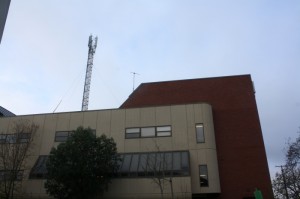Camosun College’s faculty association is speaking out against a new proposal that will extend the cell phone tower on the roof of the Fisher building at the Lansdowne campus.
According to Mark Kunen, vice-president of the Camosun College Faculty Association (CCFA), the association doesn’t support the tower extension and has sent formal documentation to the college citing a lack of consultation and possible health risks.

“We found that there were concerns about not only the additional length of the tower, but also the levels being emitted from the existing tower,” says Kunen. “I think that it is not conclusive. And we are concerned about that, and we are concerned that there has not been enough consultation with the internal college community about this project.”
The cell tower extension is a partnership between Camosun, Telus, and Wind Mobile and, if it happens, will see the existing tower being extended from 18 metres to 24 metres (no date is set for the proposed extension). As Camosun’s director of ancillary services Kathryn Le Gros explains, the extended tower will benefit not just the school, but also the students, by increasing cell phone service and boosting the college’s revenue.
“Both Telus and Wind are new to having their infrastructure located this close to our campus and the neighbourhood, so we will also be providing better service for them,” says Le Gros. “Also, the benefits to the students are entailed in the benefit to the school, which is a revenue stream. The revenue stream that comes from these cell phone companies goes towards services that tuition and government grants don’t cover.”
Le Gros ensures that all health risks are being taken into consideration and that a thorough inspection of current radio frequency emissions has been completed by Planetworks, a North Vancouver-based telecommunications engineering firm.
This inspection, she says, shows that the current levels are less than one percent of the total allowable levels according to Health Canada and Industry Canada, and that the health and safety of students and faculty is being heavily considered.
“Health Canada and Industry Canada have both set health and safety standards, and anyone operating in this environment needs to abide by those standards. The college has had independent testing done to insure that what is there now complies, and have asked for advice on this proposed activity and where this might sit,” says Le Gros. “We have a very rigorous process for entering into any sort of contractual relationship with anybody who does service on campus, and we take our role very seriously in terms of making sure we provide good services to students and that anything is done in a safe manner.”
But Kunen says that many other countries have much higher standards for cell tower emissions. Safety Code 6, which outlines Canada’s radiofrequency exposure guidelines, was last updated in 2009, Kunen points out.
“The bottom line,” says Le Gros, “is the contract helps us balance our budget.”


The student society has also taken a position skeptical of the safety claims of this expansion and demanding better testing before proceeding.